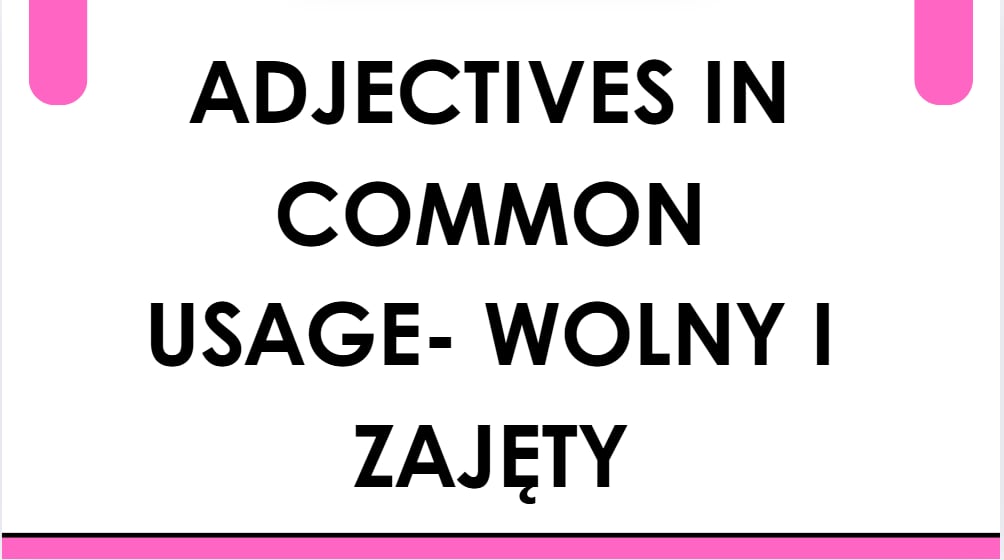Welcome to Spring! An In-depth Dive into Polish Grammar

In episode number 457 of the Learn Polish Podcast, we delve into welcoming the wonderful season of spring while having a detailed discussion about the fundamental aspects of Polish grammar. We focus on cases, declination, and variations of the word '...
In episode number 457 of the Learn Polish Podcast, we delve into welcoming the wonderful season of spring while having a detailed discussion about the fundamental aspects of Polish grammar. We focus on cases, declination, and variations of the word 'Spring' in Polish – an insightful session for those learning the language.
We consider sentence construction using different cases in Polish, illustrating how forms change in various contexts. We talk about the implications of the word 'Wiosna' (Spring) in different cases, making the process interactive and relatable. We also have a look at common errors students might make when translating directly from English, and cover useful grammar corrections.
Breaking down the grammatical designation of 'Spring' in Polish, we show how words transform in Polish cases. We transition from the nominative case, designing sentences depicting the beauty of spring in Polish grammar, to the instrumental case, the accusative case, and beyond.
In this episode, we present not just an introduction to the season, but a deeper understanding of Polish grammar made easy. Join us in our linguistic journey while embracing the essence of spring!
Feel free to comment on whether you enjoy such grammar-focused topics and if you want more podcasts concentrating on Polish cases. Regardless of your preferences, we extend our warm greetings from Roy and Kamila and look forward to catching up soon!
Words used in this Episode of Learn Polish Podcast:
To jest wiosna- It's spring
Wiosna to moja ulubiona pora roku- Spring is my favorite season
Wiosną świeci słońce- The sun shines in spring
Lubię wiosnę- I like spring
Na wiosnę robi się cieplej- It gets warmer in spring
Myślę o wiośnie- I'm thinking about spring
Rozmawiamy o wiośnie- We're talking about spring
Nie lubię wiosny- I don't like spring
Potrzebuję wiosny - I need spring
00:00 - Introduction
00:59 - Exploring the Nominative Case
03:05 - Understanding the Locative Case
04:12 - Recapping the Forms of ”Wiosna”
1
00:00:00,017 --> 00:00:06,037
Welcome to Learn Polish Podcast, episode number 457. Find other episodes on
2
00:00:06,037 --> 00:00:07,237
learnpolishpodcast.com.
3
00:00:07,337 --> 00:00:08,557
I'll meet you on YouTube and Rumble.
4
00:00:08,677 --> 00:00:11,837
Share with your kids. Thumbs up, five star rating. Share with your friends. Cześć, Kamila.
5
00:00:12,337 --> 00:00:15,897
Cześć, Roy. Witam cię serdecznie. Dzisiaj porozmawiamy o wiośnie.
6
00:00:17,297 --> 00:00:22,197
Będzie gramatyka, będzie... Może trochę trudno, zobaczymy.
7
00:00:22,597 --> 00:00:27,097
Słowo dnia, wiosna. Witamy wiosnę. We welcome spring. Witamy wiosnę.
8
00:00:27,557 --> 00:00:31,437
So, słowo dnia, first of all, is the word of the day, tak? Tak.
9
00:00:31,637 --> 00:00:36,017
Słowo dnia jest wiosna, witamy wiosnę, we welcome spring, ale nie będziemy dzisiaj
10
00:00:36,017 --> 00:00:40,757
mówić, że jest ładna pogoda, nie będziemy mówić, że wiosną, nie wiem,
11
00:00:40,917 --> 00:00:43,637
ptaki śpiewają, tylko dzisiaj... Bo pada deszcz, tak?
12
00:00:43,917 --> 00:00:48,777
Czy pada deszcz? Tylko dzisiaj będziemy koncentrować się na polskiej gramatyce.
13
00:00:49,577 --> 00:00:54,037
Deklinacja, declination, tak? Czyli polskie przypadki, Polish cases.
14
00:00:54,377 --> 00:00:57,417
Roy, czy lubisz polskie przypadki? Bardzo.
15
00:00:59,537 --> 00:01:03,737
No właśnie, wiosna to jest mianownik. Mianownik, nominative case,
16
00:01:03,857 --> 00:01:08,717
czyli forma podstawowa, forma numer jeden, wiosna. Czyli to jest wiosna.
17
00:01:09,317 --> 00:01:13,817
Wiosna to moja ulubiona pora roku. It's my favorite season. Spring is my favorite
18
00:01:13,817 --> 00:01:16,737
season of the year. Oj, czy to prawda? Wiosna to twoja ulubiona pora roku?
19
00:01:17,737 --> 00:01:22,617
Nie, bo lato. A, latem jest... Ale wiosna też jest dobrze.
20
00:01:22,777 --> 00:01:27,197
Wiosna też. Wiosna to jest forma numer jeden, mianownik, wiosna.
21
00:01:27,197 --> 00:01:32,397
To jest wiosna. Ale kiedy chcemy powiedzieć na przykład in spring, tak?
22
00:01:32,997 --> 00:01:38,917
Czyli na przykład wiosną jest bardzo ciepło, wiosną kwitną kwiaty i drzewa,
23
00:01:38,917 --> 00:01:40,857
wiosną rzadko pada deszcz.
24
00:01:41,637 --> 00:01:46,917
In spring, tak? Wiosną. To już jest inna forma, jest to narzędnik, instrumento.
25
00:01:46,957 --> 00:01:50,277
And you have wiosna kwietną kwiaty.
26
00:01:50,397 --> 00:01:51,977
What's kwietną kwiaty?
27
00:01:52,157 --> 00:01:53,997
Because I know kwiat is a flower.
28
00:01:54,517 --> 00:01:57,657
Or the blooming flowers and trees, yeah? Tak.
29
00:01:58,277 --> 00:02:03,517
Czyli wiosną. Taki klasyczny błąd jest taki, że studenci, którzy znają język
30
00:02:03,517 --> 00:02:06,877
angielski, mówią wywiosna. Tak, in spring.
31
00:02:07,497 --> 00:02:10,757
Wywiosna. Ale to nie jest dobrze. To nie jest dobra gramatyka.
32
00:02:10,917 --> 00:02:16,517
In spring po polsku to jest wiosną. I używamy tutaj narzędnika, instrumenta.
33
00:02:16,997 --> 00:02:19,417
Dobrze. Biernik. Wiosnę.
34
00:02:20,077 --> 00:02:28,617
Piszemy wiosnę. Mówimy wiosnę. Na przykład, lubię wiosnę, kocham wiosnę, witam wiosnę.
35
00:02:28,677 --> 00:02:32,857
Albo, na wiosnę robi się cieplej. Też jest taka konstrukcja.
36
00:02:32,857 --> 00:02:34,837
I też to patrzymy jako in spring.
37
00:02:35,717 --> 00:02:41,497
It's getting warm. Dobrze, na wiosnę. To jest biernik. Roy, to jest wiosna.
38
00:02:41,957 --> 00:02:45,597
Wiosną jest ciepło. Lubię wiosnę.
39
00:02:46,257 --> 00:02:50,137
Czy słyszysz różnicę? Wiosna, wiosną i wiosnę? Tak.
40
00:02:50,713 --> 00:02:56,173
But it's clear to me. But you understand, right? Is it clear? No.
41
00:02:56,553 --> 00:02:59,453
Wiosnią, wiosna, wiosna.
42
00:03:01,373 --> 00:03:04,993
Wiosna, yes. Wiosną i wiosnę. Good.
43
00:03:05,193 --> 00:03:11,233
The next form is the locative. Locative. And we remember that we use the locative
44
00:03:11,233 --> 00:03:13,213
with the adverb o, o about.
45
00:03:13,493 --> 00:03:16,293
For example, I think about the spring.
46
00:03:16,733 --> 00:03:19,913
We talk to Roy about the spring.
47
00:03:19,913 --> 00:03:24,733
Marzę, I dream, marzę o wiośnie i jest to miejscownik,
48
00:03:24,813 --> 00:03:28,713
czyli lokativus kolejna forma to jest dopełniacz,
49
00:03:28,713 --> 00:03:35,213
genetif potrzebuję czego wiosny albo ktoś może powiedzieć nie lubię wiosny,
50
00:03:35,213 --> 00:03:41,413
nie chcę wiosny ale to chyba nie jest możliwe, Roy myślisz, że jest ktoś kto nie lubi wiosny?
51
00:03:41,773 --> 00:03:50,713
Niemożliwe nie wiem nie znam ja też nie znam Myślę, że wszyscy lubią wiosnę.
52
00:03:50,873 --> 00:03:53,453
A moi nie pamiętam, potrzebuję.
53
00:03:54,393 --> 00:04:00,813
Potrzebuję to jest I need, tak? Potrzebuję wiosny, potrzebuję słońca. I need sun, tak?
54
00:04:01,133 --> 00:04:04,453
Jak powietrza. Like air.
55
00:04:05,593 --> 00:04:10,233
Czyli nie mogę żyć bez wiosny, tak? Nie mogę żyć bez wiosny.
56
00:04:10,233 --> 00:04:12,013
I can't live without spring.
57
00:04:12,333 --> 00:04:18,433
Dobrze, to jeszcze raz powtórzymy wszystkie formy. To jest wiosna. To jest wiosna.
58
00:04:19,533 --> 00:04:26,153
Wiosną świeci słońce. Wiosną świeci słońce. Lubię wiosnę.
59
00:04:27,033 --> 00:04:28,313
Lubię wiosnę.
60
00:04:29,253 --> 00:04:32,713
Myślę o wiośnie. Myślę o wiośnie.
61
00:04:33,491 --> 00:04:41,151
Potrzebuję wiosny. Potrzebuję wiosny. Potrzebuję, I need, tak? Potrzebuję wiosny.
62
00:04:41,771 --> 00:04:47,111
Roy, potrzebujesz wiosny, co? Ja potrzebuję, słowo będzie samo.
63
00:04:47,451 --> 00:04:51,351
Spring, spring, spring, spring, spring. To jest łatwiej. Roy jest smutny,
64
00:04:51,351 --> 00:04:56,171
słuchajcie, Roy jest smutny, dlatego że po angielsku wiosna to jest spring, tak?
65
00:04:56,931 --> 00:05:01,071
I tylko jedna forma, spring to jest zawsze spring po angielsku,
66
00:05:01,071 --> 00:05:06,831
a po polsku spring, wiosna, wiosną, wiosnę, wiośnie, wiosny.
67
00:05:06,971 --> 00:05:10,831
I Roy jest trochę smutny, tak? I zapońty, rozczarowany.
68
00:05:12,091 --> 00:05:17,431
Ale mam nadzieję, że rozumiesz, Roy, tak? Że rozumiesz polską gramatykę.
69
00:05:18,011 --> 00:05:24,471
Wiosna to piękna pora roku. Mam nadzieję, że wszyscy lubicie wiosnę. Ja potrzebuję wiosny.
70
00:05:25,211 --> 00:05:29,811
Pozdrawiamy Was z Royem. Napiszcie w komentarzu, czy lubicie tematy gramatyczne,
71
00:05:29,811 --> 00:05:35,091
czy lubicie deklinacje, czy chcecie więcej podcastów, gdzie właśnie robimy polskie
72
00:05:35,091 --> 00:05:38,011
przypadki, co ja wiem, że Roy nie będzie z tego zadowolony,
73
00:05:39,011 --> 00:05:43,751
jak będzie więcej podcastów gramatycznych, ale dajcie znać w komentarzu.
74
00:05:44,251 --> 00:05:46,091
Pozdrawiamy serdecznie i do zobaczenia.
75
00:05:46,611 --> 00:05:48,331
Dziękuję bardzo, Kamila. Dziękuję, Roy.
76
00:05:59,851 --> 00:06:02,771
Where I'm pitching YouTube and Rumble. And as I mentioned before,
77
00:06:02,871 --> 00:06:06,331
when you give us a thumbs up or five star rating and a comment, it really helps.
78
00:06:06,471 --> 00:06:09,591
So, next week, dziękuję bardzo i do widzenia. Do widzenia!

Polish for foreigners
Polish language school
We offer Polish courses for foreigners and we help to explore the rich world of Polish language and culture. We will make you at home in Poland as if it were your second home.

Roy Coughlan
Podfather
Serial Entrepreneur and host of 6 Podcasts. All 6 got to the Top 5%. 5 got to Top 1% and 4 to Top 0.5%.
I am a podcast coach so can help you do the same.
I can help you get on other successful Podcasts.





































